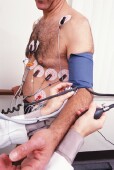 |
 |
 |

Framingham Score May Not Spot Lifetime Heart Risk
Study is third in a week to question some facet of the widely used guideline|
|
HealthDay
Monday, January 12, 2009
 MONDAY, Jan. 12 (HealthDay News) -- As many as half of people aged 50 and younger who have a low 10-year risk of heart attack or stroke based on the widely used Framingham Risk Score may still have a high lifetime risk.
MONDAY, Jan. 12 (HealthDay News) -- As many as half of people aged 50 and younger who have a low 10-year risk of heart attack or stroke based on the widely used Framingham Risk Score may still have a high lifetime risk.
That's the conclusion of a new study published in the Jan. 13 issue of Circulation. It's the third study published in the last week to question the Framingham Risk Score's ability to accurately predict cardiovascular risk among all people.
The new study specifically found that the Framingham Risk Score may be good at predicting the 10-year probability of heart attack or stroke for people younger than 50, but it falls short at assessing longer-term risk.
The Framingham score is based on a decades-long study in that Massachusetts community. It assesses the risk of cardiovascular events such as heart attack and stroke on the basis of seven factors -- age, gender, total blood cholesterol, HDL (good) cholesterol, systolic blood pressure (the higher of the desired 120 over 80 reading), smoking status, and whether blood pressure medication is being taken.
For the new study, 90 percent of the almost 4,000 participants -- all 50 or younger -- were classified as having a low 10-year risk of cardiovascular disease, based on the Framingham criteria. But a careful look at the risk factors other than age divided the participants into two groups -- those having either a low or a high lifetime risk, said study lead author Dr. Jarrett D. Berry, at assistant professor of medicine at the University of Texas Southwestern Medical Center at Dallas.
The differences in the classic risk factors such as cholesterol levels and blood pressure "were very significant in terms of long-term risk, even though we don't see those differences in short-term risk," Berry said.
The researchers then verified their estimates by scanning the arteries of the participants. Among those estimated to have a higher lifetime risk, the researchers found a greater amount of calcium deposits in the coronary artery and significantly greater thickening of the carotid artery, the major blood vessel to the brain.
"Those with a higher lifetime risk had a greater burden and greater progression of atherosclerosis," Berry said. Atherosclerosis is the hardening of the arteries that can lead to a heart attack, stroke or other cardiovascular problems.
Berry said the Framingham Risk Score remains an important indicator of short-term risk. But, he added, "We feel that this study emphasizes the role of risk factors and the effect they have across the entire life span."
Dr. Kevin M. Johnson, assistant clinical professor of diagnostic radiology at Yale University, said, "This [new study] is another example of how the Framingham Risk Score leaves room for improvement. This paper is part of a discussion about where the weaknesses are and how we can come up with a better risk estimate."
Johnson was lead author of a report published last week in the American Journal of Roentgenology that showed that the Framingham score did not accurately predict cardiovascular risk in a group of people with no history of coronary heart disease. His study also used blood vessel scans, with computerized tomography showing the amount of potentially clogging plaque in the arteries.
Johnson said a new risk assessment "will incorporate the Framingham ideas, but the way they are counted and thrown into the equation will differ."
Hi-tech imaging could be used to help define risk, but there are problems with its everyday use, such as cost and exposure to radiation, he said.
"The question is how we can put together a scheme in which we use the Framingham risk factors, perhaps with calcium scanning for some people and CT for others," Johnson said. "Events are pushing people toward some kind of revision."
The third recent study to question the Framingham score concerned a specific group of people not covered by the criteria -- those 85 and older. The Framingham score did no better than chance in predicting the 108 deaths that occurred among the 215 women and 87 men who were followed for five years, said researchers from Leiden University Medical Center in the Netherlands. The finding was published online Jan. 9 in the journal BMJ.
HealthDay
Copyright (c) 2009 ScoutNews, LLC. All rights reserved.
Related News:
More News on this Date
Related MedlinePlus Pages:
| Home | Health Topics | Drugs & Supplements | Encyclopedia | Dictionary | News | Directories | Other Resources | |
| Disclaimers | Copyright | Privacy | Accessibility | Quality Guidelines U.S. National Library of Medicine, 8600 Rockville Pike, Bethesda, MD 20894 National Institutes of Health | Department of Health & Human Services |
Date last updated: 13 January 2009 |




